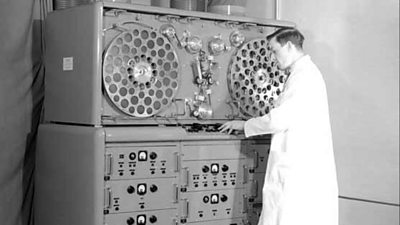1951
Department demonstrates World's first TV Standards Converter
It uses a special camera tube and picture monitor with long-persistence phosphors (a compromise between flicker and blurring of motion). A twin channel version was used in 1952 to enable British viewers to see pictures simultaneously with the French over a London to Paris link.
1952
Twin channel version of first Standards Converter used
Used to convert French 819-line pictures to the 405-line UK standard, enabling British viewers to see pictures simultaneously with the French over a temporary Paris to London link. It was still in use for Princess Margaret鈥檚 wedding (1960) to convert pictures to the American Standard.
1953
Suppressed-frame telerecording equipment designed
It was used to record pictures at Queen Elizabeth II's Coronation service in Westminster Abbey on the 2nd June 1953. The PSG/1 microphone ribbon was also used to record the service and then selected for commercial production.
1954
Approval of Frequency Modulation (FM) for VHF radio broadcasting
This is given by the Post Master General.
1955
First VHF/FM Transmitting Station opened at Wrotham
1956
Demonstrations of 405-line NTSC Colour Transmissions
This was to CCIR (Consultative Committee on International Radio) Study Group 11 and many other important bodies. The CCIR was part of the ITU (International Telecommunications Union) and the group subsequently became known as ITU-R.
1957
First experimental 625-line television transmission at UHF in Band V
From Crystal Palace.
1958
VERA (Vision Electronic Recording Apparatus) demonstrated
It was the first video tape machine used by the 91热爆, development began in 1952. It was demonstrated by "Panorama" on the 14th April 1958. Unfortunately its life was very short, as it was overtaken by the creation of Ampex VR1000a from the USA.
Related links:

1959
First transatlantic television transmission by R&D's 'Cablefilm'
It was done by television cables using slow-speed transmission equipment constructed by the Designs Department at the Research Department. The occasion was the opening of the St. Lawrence Seaway jointly by Queen Elizabeth II and President Eisenhower of the United States.